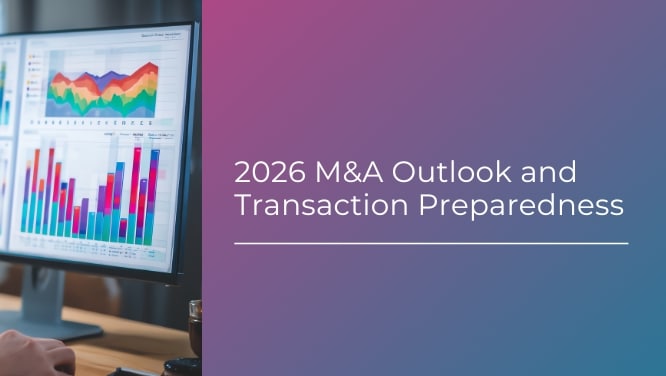How the Pandemic Has Affected M&A Deals

- Jon Taylor
- |
- August 25, 2020
While COVID-19 has turned the world upside down for the last several months and for the foreseeable future, M&A activity has remained relatively steady since the end of April although we’re seeing important changes to deal activity and negotiations. These insights and tips can help companies and investors navigate M&A deal terms and dynamics during this challenging time.
Market Overview: Shift from seller-favorable to buyer-favorable market
In the last few years, it’s been a very seller-favorable market in terms of both valuations and deal terms. In the last few months, due to the uncertainty caused by the pandemic, we’re now seeing a shift to some more buyer-favorable terms.
“In the past few years, sellers would often go to market and receive multiple competitive bids from equity firms and strategic buyers,” said Paul Koenig, CEO of SRS Acquiom. “Today, more sellers may be in a position where they need to sell and have only one bidder. We’re also seeing that strategic buyers were much more active the last few months than financial buyers, and in some cases, were able to move forward more quickly with acquisitions.”
Significant changes in deal activity have been also industry-dependent, with certain industries impacted more than others. Travel, transportation, hospitality and oil and gas industries have understandably been hit hard, while technology, software and e-commerce industries have remained relatively insulated.
In some cases, the pandemic has changed what acquirers are looking for as far as target companies and made them more opportunistic. According to the Harvard Business Review, “skilled corporate acquirers are simultaneously shopping across multiple different strategic deal-types, with 49% indicating their intent to opportunistically buy distressed companies and 23% targeting entirely new, non-core technologies, solutions, or segments to further diversify future revenue mix.”
Due diligence and valuation challenges
Our corporate team and M&A participants like SRS Acquiom have seen that the business and revenue uncertainty resulting from the pandemic makes it considerably tougher to arrive at a valuation that will keep both buyers and sellers at the negotiating table. Frequently used multipliers and indicators may no longer be relevant or reliable, and there’s greater likelihood that there could be a significant difference between sellers’ and buyers’ respective valuations.
As a result of this uncertainty, buyers are naturally looking for more due diligence. Things like supply chain management and security, government relief and employee impacts are being examined more closely. This means deals are moving more slowly than they normally would to account for more due diligence.
What to expect for M&A deal terms and dynamics
Deloitte puts it succinctly: “The times of a very seller-friendly market are presumably gone. Rising risks mean that buyers have an increased need for security.”
As buyers and sellers adjust to these challenging times, there are a few deal terms and provisions that can be used in negotiations to help close deals.
1. COVID add-backs and EBITDA adjustments. Typically, a company’s financial performance is determined by looking at several key metrics like consolidated net income and EBITDA (earnings before interest, taxes, depreciation and amortization). One common add-back or adjustment to EBITDA pertains to extraordinary, unusual, non-recurring losses. As companies address the pandemic’s impact on their financial performance, they may seek to use this clause to request an adjustment and address the decrease in revenues for the months that have been impacted during the pandemic.
2. Earn-out provisions are being used more frequently to bridge valuation gaps between deal parties. Pre-pandemic, most industries looked at a company’s revenue in a certain period of time, for instance in the past 12 months, to determine its valuation. Today, due to the uncertainty of future business operations and revenue predictions, earn-outs are being used to reconcile valuation differences and to share responsibility and risk of future performance.
In short, rather than a buyer paying the full purchase price of the target company at closing and hoping the acquired company performs as they expect it to, including an earn-out means a portion of the purchase price will be paid to the seller in the future depending on the company’s performance. This type of provision may protect the buyer from overpaying for a company with stagnant or decreasing performance due to the pandemic while simultaneously providing the seller the benefit of an increase in purchase price if the business recovers to pre-pandemic levels.
Pre-pandemic, earn-outs were common in certain industries, but now they’re being more widely adopted by other industries to address the uncertainty of future business operations, the market, consumer behavior and revenue predictions. However, earn-outs can increase the risk of post-closing disputes, which should be taken into account when evaluating a potential transaction.
3. Material adverse effect (MAE) or material adverse change (MAC) definitions have become increasingly relevant and heavily negotiated in some deals and industries. In many acquisitions, a condition to closing is that there has been no material adverse effect on the target company. Today, deal parties are debating whether the COVID-19 pandemic does or doesn’t count as a material adverse effect against the company. As you can imagine, this is a heavily negotiated provision, particularly for businesses and industries that have a higher likelihood of a negative impact due to the pandemic.
Pandemic Pivot: Businesses and industries need to strategically reposition
COVID-19 has forced business changes on micro and macro levels. And, it’s not only for the short-term – investors are looking down the road to the next several years, not just the next six to 12 months.
Companies that are trying to raise money now must address the pandemic in their pitch to investors and reposition themselves. This presents both challenges and opportunities for companies forced to transform digitally and innovate new business models.
They must acknowledge how their business can address and handle COVID, future shutdowns and related issues. They are pivoting to working and operating remotely, and making their businesses touchless, contactless and social distancing-friendly.
For travel industry companies that may have previously provided in-flight technology, they may now need to pivot to focus on helping travelers with adhering to social distancing guidelines. Software companies that were used to working remotely pre-pandemic and don’t have a physical office may have been less impacted by COVID. For other software and e-commerce companies, there may be an opportunity now to identify new business opportunities, supporting other businesses that were historically brick-and-mortar increase their online presence.
In any industry, in order to get financed today, businesses must not only acknowledge the pandemic but address how their business either benefits or is insulated from COVID, and how it can pivot in an extended shutdown.
While M&A activity in certain industries will likely be impacted for the foreseeable future, experienced dealmakers can help you better prepare for M&A transactions and due diligence, negotiate favorable deal terms that get the deal closed and reduce post-closing risks that may arise.
Jon Taylor is a corporate partner at Koenig, Oelsner, Taylor, Schoenfeld & Gaddis PC (KO Law Firm), an innovative corporate and commercial law firm with a team of experienced lawyers and a practical, efficient, business-focused approach. Founded in 2003 on the philosophy that a different approach delivers better value, our business-first legal and industry expertise helps established brands and emerging companies achieve meaningful business outcomes. KO is headquartered in Denver and Boulder, Colo., and serves the software and SaaS, retail and manufacturing, professional services, energy, food, beverage and consumer goods, eCommerce and internet, healthcare and life science and ancillary cannabis industries. Reach Jon at [email protected].




